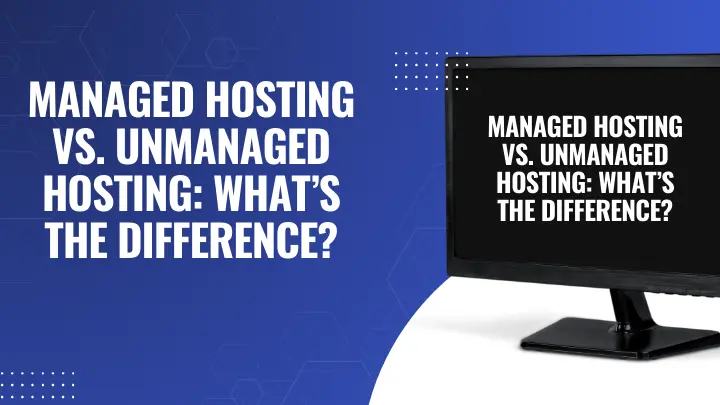Managed Hosting vs. Unmanaged Hosting: What’s the Difference?
When setting up a website or online application, one of the key decisions to make is choosing the right hosting solution. Web hosting providers offer various types of hosting plans, with two major categories being managed hosting and unmanaged hosting. Understanding the differences between these two options is crucial for determining which best suits your needs.

In this article, we will explain the distinctions between managed and unmanaged hosting, their respective advantages and disadvantages, and help you decide which option might be the right fit for your website.
1. What is Managed Hosting?
Managed hosting refers to a hosting service where the hosting provider takes care of all the server management tasks, including maintenance, security updates, backups, and monitoring. Essentially, the hosting provider acts as your IT department, ensuring that your server and website are always in optimal condition.
Key Features of Managed Hosting:
- Server Management: The hosting provider takes responsibility for maintaining and updating the server infrastructure.
- Security Monitoring: The provider installs security patches, firewalls, and performs regular scans to detect and prevent potential threats.
- Backups: Regular automated backups ensure that your data is safe and can be easily restored if needed.
- Performance Optimization: The hosting provider handles optimizations to ensure fast load times and minimal downtime.
- Technical Support: Managed hosting often comes with 24/7 support, allowing you to quickly resolve any issues that arise.
Advantages of Managed Hosting:
- 1.1 Ease of Use: Managed hosting is ideal for users who lack technical knowledge or time to manage a server. You don’t need to worry about the complexities of server administration.
- 1.2 Enhanced Security: Hosting providers implement robust security measures, ensuring your site is protected from cyber threats.
- 1.3 Regular Backups: Automated backups provide peace of mind, knowing that your data is secure and can be recovered if needed.
- 1.4 Better Performance: Managed hosting providers often optimize servers to improve performance, resulting in faster loading times and better uptime.
Disadvantages of Managed Hosting:
- 1.5 Higher Costs: Managed hosting is typically more expensive than unmanaged hosting due to the additional services provided.
- 1.6 Limited Control: With managed hosting, you have less control over server configurations and customizations, as the provider handles most of the management.
Managed hosting is perfect for businesses and individuals who want a hassle-free hosting experience, allowing them to focus on growing their website rather than managing technical tasks.
2. What is Unmanaged Hosting?
Unmanaged hosting, also known as self-managed hosting, provides you with access to a server, but the responsibility of managing the server falls entirely on you. This means you’ll need to handle everything from installation and configuration to security and updates.
Key Features of Unmanaged Hosting:
- Full Control: You have complete control over the server environment, allowing you to customize it to your specific needs.
- Flexibility: Unmanaged hosting offers more flexibility in terms of software installation, settings, and performance tweaks.
- Basic Hosting Infrastructure: The hosting provider typically only offers the server and network, leaving the rest of the management to you.
Advantages of Unmanaged Hosting:
- 2.1 Lower Costs: Unmanaged hosting tends to be more affordable since the hosting provider doesn’t need to manage the server for you.
- 2.2 Complete Control: You have full access to the server, allowing you to install any software, change configurations, and optimize the server as you see fit.
- 2.3 Flexibility in Customization: With unmanaged hosting, you can tailor your server to fit specific needs and requirements, especially useful for developers and businesses with unique applications.
Disadvantages of Unmanaged Hosting:
- 2.4 Technical Expertise Required: Unmanaged hosting is best suited for users with technical knowledge in server management, or those with access to IT staff. You will need to handle tasks like updates, security patches, and troubleshooting.
- 2.5 Time-Consuming: Managing a server can be time-consuming, particularly if issues arise. You will be responsible for resolving any problems, which can take time away from other important tasks.
- 2.6 Higher Risk of Downtime: Without regular maintenance and monitoring, there’s a higher risk of downtime or performance issues, which could negatively impact your website.
Unmanaged hosting is ideal for tech-savvy users who prefer full control over their server environment and are comfortable handling server management tasks themselves.
3. Managed Hosting vs. Unmanaged Hosting: A Detailed Comparison
3.1 Server Management
- Managed Hosting: The hosting provider takes care of everything, including server setup, monitoring, updates, and maintenance. You don’t have to worry about the technical side of things.
- Unmanaged Hosting: You are responsible for server management, including setup, software installation, security updates, and maintenance.
3.2 Security
- Managed Hosting: Managed hosting typically comes with advanced security measures like firewalls, malware scanning, and regular updates, all handled by the provider.
- Unmanaged Hosting: You’ll need to handle security on your own, which includes installing security patches, monitoring for potential threats, and setting up firewalls.
3.3 Control and Customization
- Managed Hosting: The hosting provider handles most of the server configurations, which limits your control over customization. However, this is usually not an issue for non-technical users.
- Unmanaged Hosting: You have full control over your server, allowing you to customize settings and install software according to your needs.
3.4 Technical Expertise
- Managed Hosting: Requires little to no technical knowledge since the hosting provider handles all server-related tasks.
- Unmanaged Hosting: Requires advanced technical skills, as you are responsible for managing the server and resolving any issues that arise.
3.5 Costs
- Managed Hosting: Typically more expensive due to the additional services provided by the hosting provider.
- Unmanaged Hosting: More affordable because you are not paying for server management services, but the cost may increase if you need to hire IT staff or technical support.
3.6 Performance Optimization
- Managed Hosting: The provider often optimizes the server for performance, ensuring fast loading times and minimal downtime.
- Unmanaged Hosting: You’ll need to optimize the server yourself, which can be challenging if you lack technical expertise.
3.7 Backup and Recovery
- Managed Hosting: Regular automated backups are typically included, ensuring that your data is safe and can be restored in case of an emergency.
- Unmanaged Hosting: You’ll need to set up and manage your own backup system, which could lead to data loss if not done properly.
4. Choosing the Right Hosting Option for Your Needs
4.1 When to Choose Managed Hosting:
- Lack of Technical Expertise: If you don’t have the skills or time to manage a server, managed hosting is the best option.
- Focus on Business: If you’d rather focus on growing your business or website without worrying about the technical aspects of server management, managed hosting is a stress-free solution.
- Security is a Priority: Managed hosting is ideal for businesses that require strong security features and regular updates without having to manage these aspects themselves.
4.2 When to Choose Unmanaged Hosting:
- Technical Know-How: If you’re a developer or have a dedicated IT team with server management experience, unmanaged hosting offers more control and flexibility.
- Tight Budget: Unmanaged hosting is more affordable and can be a great option if you’re comfortable managing the server yourself and want to save on costs.
- Customization Needs: Unmanaged hosting is ideal if your website or application requires specific configurations or software that isn’t available on managed hosting plans.
5. Conclusion
In the debate between managed hosting and unmanaged hosting, the right choice largely depends on your needs, technical expertise, and budget. Managed hosting provides convenience, security, and peace of mind, making it an excellent option for businesses and individuals without technical knowledge. On the other hand, unmanaged hosting offers greater control and flexibility at a lower cost, making it suitable for tech-savvy users or those with IT teams.
Both managed and unmanaged hosting have their advantages and disadvantages. If you value ease of use and reliability, managed hosting is the way to go. However, if you prefer complete control and are confident in your technical skills, unmanaged hosting may be the better option.
Common Questions
- What is the main difference between managed and unmanaged hosting?
- The main difference is that managed hosting includes server management, security, and maintenance handled by the hosting provider, whereas unmanaged hosting requires you to manage these tasks yourself.
- Which hosting option is more affordable?
- Unmanaged hosting is generally more affordable since the provider doesn’t offer additional services like server management or maintenance.
- Do I need technical skills for managed hosting?
- No, managed hosting is designed for users who don’t have technical skills. The hosting provider handles all the technical aspects for you.
- Can I switch from unmanaged hosting to managed hosting?
- Yes, most hosting providers allow you to upgrade from unmanaged to managed hosting if you find that you need additional support and services.
- Which option is better for website performance?
Managed hosting providers often optimize server performance for you, while unmanaged hosting performance depends on how well you can manage and configure the server.



Pingback: How Much Does Web Hosting Really Cost? | 2024 Price Guide